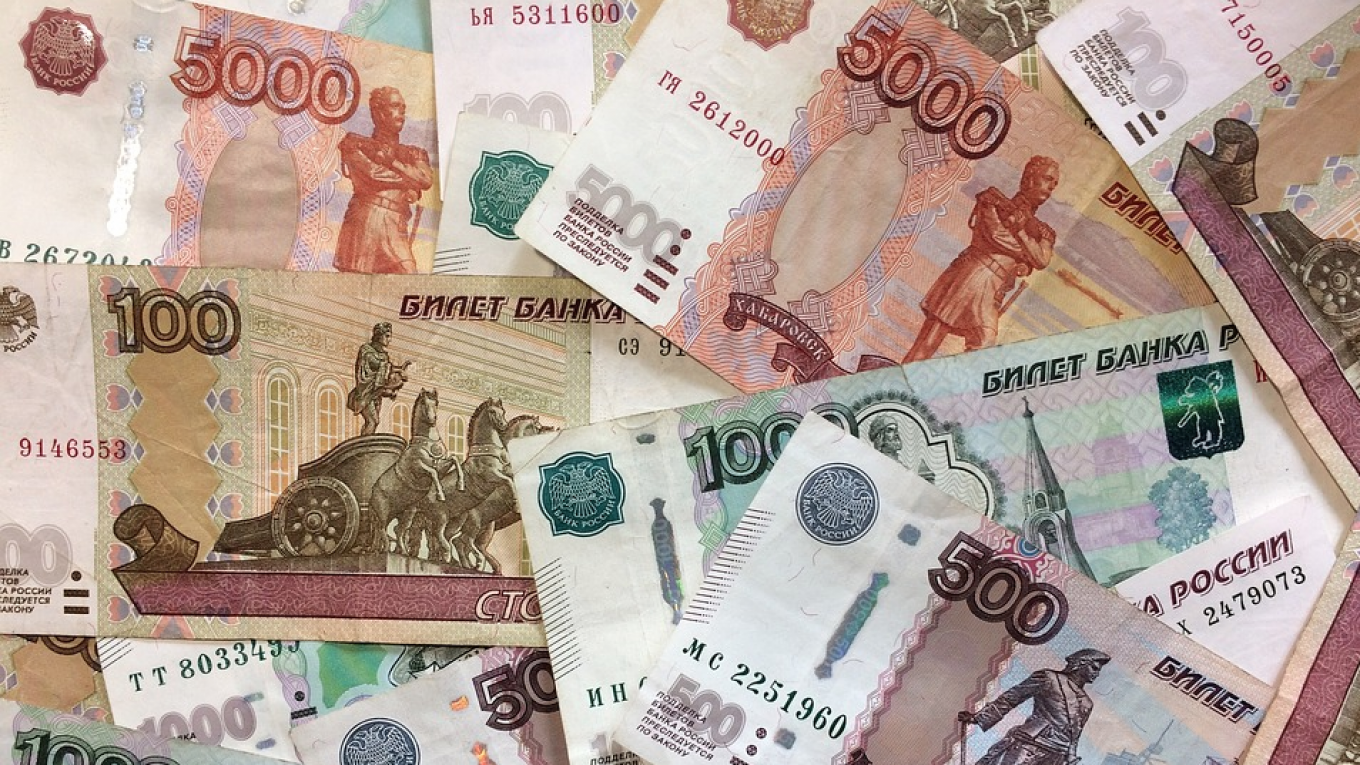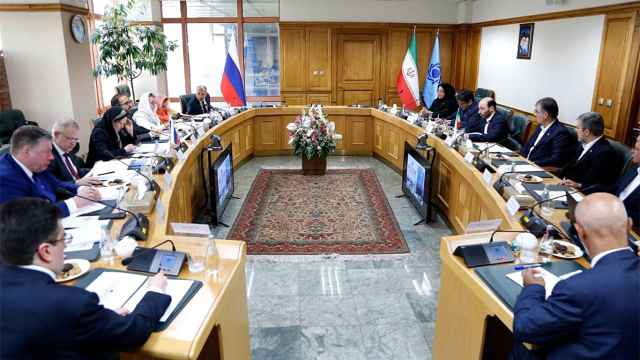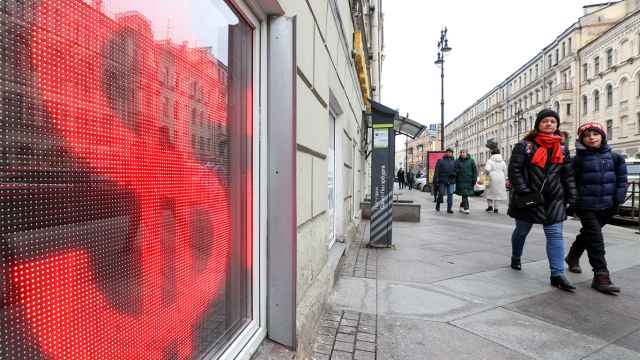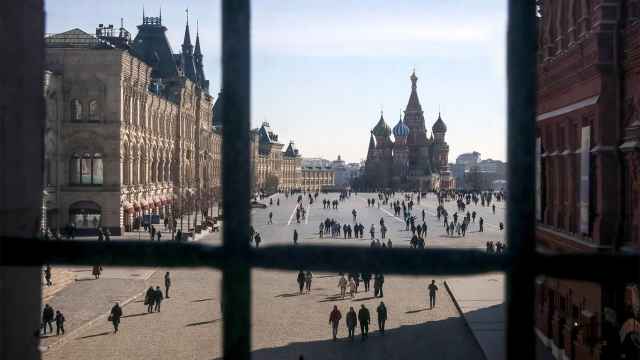Russia’s ruble fell to 69.40 against the dollar on Aug. 13, its lowest level in two years, pulled down by a combination of the threat of new U.S. sanctions and the collapse of the Turkish lira.
The Central Bank of Russia (CBR) blamed the fall in the ruble’s value on new U.S. sanctions bills recently introduced to Congress, but said the central bank “has enough instruments to prevent threats to financial stability,” adding the current high volatility in exchange rates is temporary.
Russian Finance Minister Anton Siluanov noted that the dollar has become a more and more risky instrument for international settlements and Russia may start using other currencies for oil trading — a long-standing Kremlin ambition. Russia has experimented with oil trading in rubles on the St. Petersburg commodity exchange, but the idea has not caught on yet.
The CBR has also said it is willing to intervene in the currency markets if the volatility in the exchange rates becomes too great. The finance ministry has already stopped buying currency to build up Russia’s gross international reserves, putting recently announced plans to increase buying currency on hold. The CBR said that all planned purchases of foreign currencies for reserves will be done anyway in accordance with the budget rule.
“Our general expectations for this week are USD-RUB: 67.00-70.00 and EUR-RUB 76.20-79.70,” Commerzbank bank analysts said in a note on Aug. 14.
While the risks of contagion from the Turkish currency crisis are low, that doesn't mean there is no effect: Other emerging market currencies have also been falling as a result of Ankara’s problems.
“Not only Russian currency is experiencing strong risk-off pressure now. After U.S. President Donald Trump approved the increase of duties on steel and aluminum from Turkey, the Turkish lira collapsed against the dollar, touching a historical minimum at 7.14 and corrected to 6.70 on Monday after Turkish regulators announced support measures for commercial banks. The sharp depreciation of the lira triggered a drop in other emerging market currencies and this is another factor that pressured the ruble,” Commerzbank said.
What happens to the ruble next will depend on the details of the new U.S. sanctions. The bill introduced to Congress will be heard in September after the summer break. The draft version contains some very harsh measures such as sanctions on international investors holding both Russia’s sovereign and local debt but analysts say these measures are unlikely to survive as they would adversely affect a lot of U.S. investors as both bond types are widely held by international investors.
“[The bill] contains the ban on operations in the U.S. and freezing of assets of seven of Russia’s largest banks. This would mean that there will be no possibility for them to conduct usual dollar settlements via correspondent accounts in U.S. banks. Another possible restriction aimed to the new issues of OFZ with more than two weeks period. Market sentiment is sensitive and may remain in the near term, until the final decision is announced,” Commerzbank said.
In addition, there is another list of U.S. sanctions, related to the poisoning of Sergei Skripal and his daughter, that will come into force on Aug. 22 that include restrictions on the supply of weapons and goods including aircraft, engines, microchips and electronics to Russia. These are more technology bans than corporate or financial and so are expected to have a limited impact on Russian assets or the currency, although they are clearly negative for sentiment.
“Coupled with traditionally low liquidity during summer we will see ongoing high RUB volatility. Until new possible sanctions become clear, it’s unlikely that RUB will return to its July RUB62-64 levels. The EUR-RUB pair is now trading around 77.20 levels it has rebounded after morning surge to 79.00. USD-RUB sharply rose to RUB69.38 during the Asian session and now trading at RUB67.84,” Commerzbank said.
Oil prices have also been affected by the crisis, but they remain at elevated levels. The Russian budget continues to assume oil prices of $40 average in the year, but oil has been trading at an average of $65 per barrel over the first four months of this year and over $75 for the last three months – well ahead of the value of $53 a barrel needed for the Russian budget to break even, down from a peak breakeven price of $115 in the boom years.
That means the Russian budget will turn in a headline surplus this year for the first time in years of between 1.5 percent and 2 percent of GDP, according to a Ministry of Finance statement this week. Moreover, Russia’s oil production is expected to rise further in 2019 to some 11.2 million barrels a day next year according to a recent forecast by Opec.
Brent futures have come off their highs of over $80 in the last month due to the crises but were still trading around $72.70 on August 13 according to Commerzbank.
“Ongoing fears of Iran’s oil supplies reduction are supporting the price and may remain in the near future. US sanctions on Iran oil industry will come into force on Nov. 5,” says Commerzbank.
Where the crisis in Turkey goes from here remains unclear. The Turkish President Recep Tayyip Erdogan has made it clear that he doesn't think the country is in crisis at all and believes that the currency will stabilise on its own, without intervention by the central bank. The market has taken the opposite view.
Investors are worried about contagion to other markets, but those fears are muted due to the limited size of the Turkish market.
Ken Wattret, chief European economist at IHS Markit, said in a note on Aug. 14: “The banking sector is one of the transmission channels of the problems in Turkey spilling over to Europe more broadly. Banking sector exposure varies considerably depending on the country.”
Spanish banks have by far the biggest collective exposure, according to IHS Markit, at more than 30 percent of total foreign claims on Turkey.
“This share has risen markedly in recent years, more than tripling since the first quarter of 2013. French banks account for the next highest share, which has been relatively stable at around 15 percent. Next is the UK banking sector, which accounts for around 7 percent of total foreign claims, less than half the share back in the first quarter of 2013. Greek banking sector exposure is negligible currently, but accounted for 13 percent of total foreign claims in the first quarter of 2013. By way of comparison, the share of U.S. banks in total foreign claims is similar to that of the UK, at just under 7 percent, and has also fallen markedly in recent years,” Wattret said.
Another transmission channel is trade exposure to the Turkish economy, but here again Turkish trade plays a relatively small role in the trade regimes for most of the countries in the region, with Bulgaria being the most exposed as its exports to Turkey account for 5 percent of total export.
“As with the banking sector, European countries’ export exposure to Turkey varies considerably. For Bulgaria, Greece and Russia, Turkey accounts for over 5 percent of total goods exports, a significant share. Exposure is much less significant elsewhere,” says Wattret.
Read more at bne.eu

A Message from The Moscow Times:
Dear readers,
We are facing unprecedented challenges. Russia's Prosecutor General's Office has designated The Moscow Times as an "undesirable" organization, criminalizing our work and putting our staff at risk of prosecution. This follows our earlier unjust labeling as a "foreign agent."
These actions are direct attempts to silence independent journalism in Russia. The authorities claim our work "discredits the decisions of the Russian leadership." We see things differently: we strive to provide accurate, unbiased reporting on Russia.
We, the journalists of The Moscow Times, refuse to be silenced. But to continue our work, we need your help.
Your support, no matter how small, makes a world of difference. If you can, please support us monthly starting from just $2. It's quick to set up, and every contribution makes a significant impact.
By supporting The Moscow Times, you're defending open, independent journalism in the face of repression. Thank you for standing with us.
Remind me later.







